Deck 17: Energy Conservation
Question
Question
Question
Question
Question
Question
Question
Question
Question
Question
Question
Question
Question
Question
Question
Question
Question
Question
Question
Question

Unlock Deck
Sign up to unlock the cards in this deck!
Unlock Deck
Unlock Deck
1/20
Play
Full screen (f)
Deck 17: Energy Conservation
1
A coal-fired cogeneration station provides electricity and heat to a 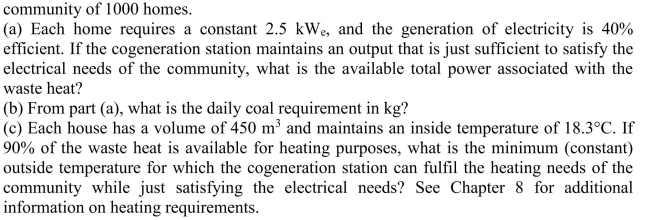

(a) The total thermal energy generated is 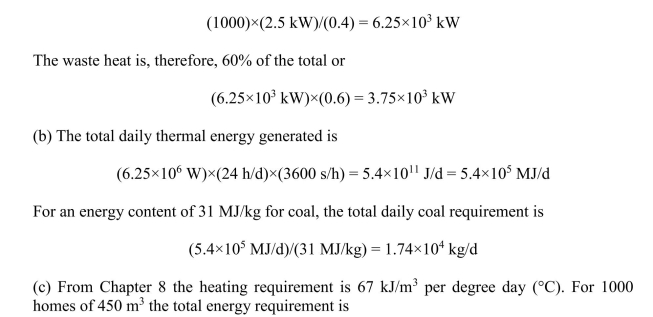
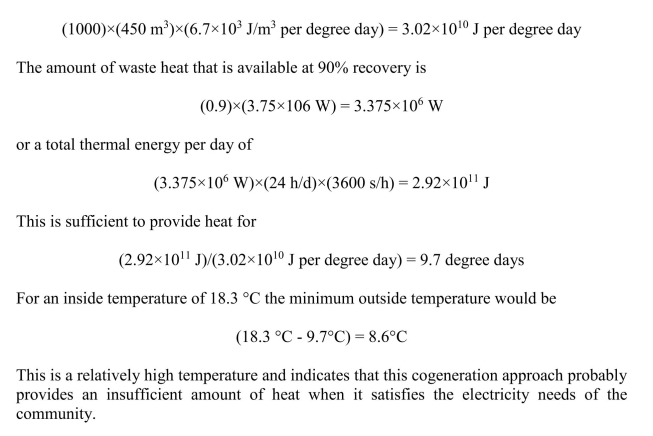


2
Compare the primary energy requirement per km travelled for an average
1970 gasoline passenger vehicle in the United States to that for an average 2014 passenger
vehicle.
1970 gasoline passenger vehicle in the United States to that for an average 2014 passenger
vehicle.
 mpg. Gasoline yields 1.38×102 MJ/gal. The primary energy use per km travelled for the
mpg. Gasoline yields 1.38×102 MJ/gal. The primary energy use per km travelled for the1970 vehicle is

3
In a local store, find the price of a 60-W incandescent bulb and CFL and
LED bulbs with an equivalent light output. Based on a use of 4 hours per day and an
electricity cost of $0.11/kWh, calculate the payback period for each of these bulbs
compared to the incandescent.
LED bulbs with an equivalent light output. Based on a use of 4 hours per day and an
electricity cost of $0.11/kWh, calculate the payback period for each of these bulbs
compared to the incandescent.
At a local department store the following items are found 
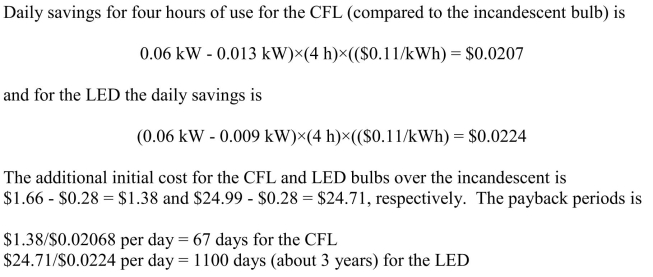


4
The following table gives specifications for some 2012 automobiles sold in
the United States.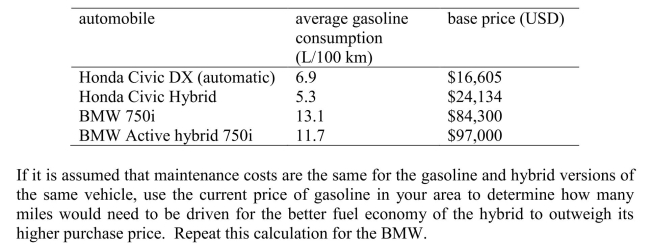
the United States.


Unlock Deck
Unlock for access to all 20 flashcards in this deck.
Unlock Deck
k this deck
5
A home owner in Maine replaces six 60-W incandescent bulbs in a family
room with equivalent CFL's. Using the following information, estimate the net annual
energy savings (in dollars) for lighting and heating. The lamps are on an average of 3.5
hours per day and electricity costs $0.105 per kWh. The home is heated with an oil furnace
at an efficiency of 87% and home heating fuel costs $0.74 per liter. There are 191 days per
year that heat is required and there is no air conditioning.
room with equivalent CFL's. Using the following information, estimate the net annual
energy savings (in dollars) for lighting and heating. The lamps are on an average of 3.5
hours per day and electricity costs $0.105 per kWh. The home is heated with an oil furnace
at an efficiency of 87% and home heating fuel costs $0.74 per liter. There are 191 days per
year that heat is required and there is no air conditioning.

Unlock Deck
Unlock for access to all 20 flashcards in this deck.
Unlock Deck
k this deck
6
From equations (17.4) and (17.5), solve for Tc (i.e., the minimum 


Unlock Deck
Unlock for access to all 20 flashcards in this deck.
Unlock Deck
k this deck
7
For Figure 17.3, estimate the energy gaps for each of the three LEDs in the
white LED package.
white LED package.

Unlock Deck
Unlock for access to all 20 flashcards in this deck.
Unlock Deck
k this deck
8
(a) From Figure 17.4, estimate the energy gap of a GaN or InGaN LED. 


Unlock Deck
Unlock for access to all 20 flashcards in this deck.
Unlock Deck
k this deck
9
A large North American city can have 100,000 street lamps. If these are 


Unlock Deck
Unlock for access to all 20 flashcards in this deck.
Unlock Deck
k this deck
10
(a) A future home owner is specifying construction materials for a new 


Unlock Deck
Unlock for access to all 20 flashcards in this deck.
Unlock Deck
k this deck
11
(a) An old 68% efficient natural gas furnace is used to heat a 400 m3 home 


Unlock Deck
Unlock for access to all 20 flashcards in this deck.
Unlock Deck
k this deck
12
Compare the overall efficiency of heating a house with oil at 85% efficiency
and heating a house with a heat pump with a coefficient of performance of 6 using
electricity generated by a heat engine at 35% efficiency.
and heating a house with a heat pump with a coefficient of performance of 6 using
electricity generated by a heat engine at 35% efficiency.

Unlock Deck
Unlock for access to all 20 flashcards in this deck.
Unlock Deck
k this deck
13
A house has 




Unlock Deck
Unlock for access to all 20 flashcards in this deck.
Unlock Deck
k this deck
14
R = 0.18 windows in a house are replaced with R = 0.52 windows at a cost 


Unlock Deck
Unlock for access to all 20 flashcards in this deck.
Unlock Deck
k this deck
15
Consider the heat losses through the four exterior walls of a house. The
house is 9.0 m × 12.0 m and the walls are 3.0 m high. There are 12 windows, each 1 m ×
1.6 m. The walls are uninsulated and have an R-value of R = 1.0 and the windows are
(uncoated) single pane. The home owner has the option of either upgrading the windows
to (uncoated) triple pane or introducing insulation into the walls to increase their R-value
to R = 3.5. Which action will provide the greatest benefit? In this problem ignore doors
and heat losses through the floor and roof.
house is 9.0 m × 12.0 m and the walls are 3.0 m high. There are 12 windows, each 1 m ×
1.6 m. The walls are uninsulated and have an R-value of R = 1.0 and the windows are
(uncoated) single pane. The home owner has the option of either upgrading the windows
to (uncoated) triple pane or introducing insulation into the walls to increase their R-value
to R = 3.5. Which action will provide the greatest benefit? In this problem ignore doors
and heat losses through the floor and roof.

Unlock Deck
Unlock for access to all 20 flashcards in this deck.
Unlock Deck
k this deck
16
A 9 W LED lamp produces light at an intensity comparable to a 60 W 


Unlock Deck
Unlock for access to all 20 flashcards in this deck.
Unlock Deck
k this deck
17
heat pump operates with an outside temperature of −10°C and an inside
temperature of +19°C. If the building requires 1.6 GJ of heat per day, what is the average
power requirement in kW for the heat pump?
temperature of +19°C. If the building requires 1.6 GJ of heat per day, what is the average
power requirement in kW for the heat pump?

Unlock Deck
Unlock for access to all 20 flashcards in this deck.
Unlock Deck
k this deck
18
One approach to cogeneration (electricity and heat) for a community is to 


Unlock Deck
Unlock for access to all 20 flashcards in this deck.
Unlock Deck
k this deck
19
Consider typical passenger automobiles in the United States. Calculate the
reduction in CO2 emissions (in tonnes) for a 2008 vehicle compared to a 1966 vehicle
during the lifetime of the vehicle (assumed to be 250,000 km).
reduction in CO2 emissions (in tonnes) for a 2008 vehicle compared to a 1966 vehicle
during the lifetime of the vehicle (assumed to be 250,000 km).

Unlock Deck
Unlock for access to all 20 flashcards in this deck.
Unlock Deck
k this deck
20
Refer to Figure 2.5. What fraction of waste heat from electricity generation
in the United States would be needed to satisfy all of the country's residential fossil fuel
use (primarily for heating)?
in the United States would be needed to satisfy all of the country's residential fossil fuel
use (primarily for heating)?

Unlock Deck
Unlock for access to all 20 flashcards in this deck.
Unlock Deck
k this deck


